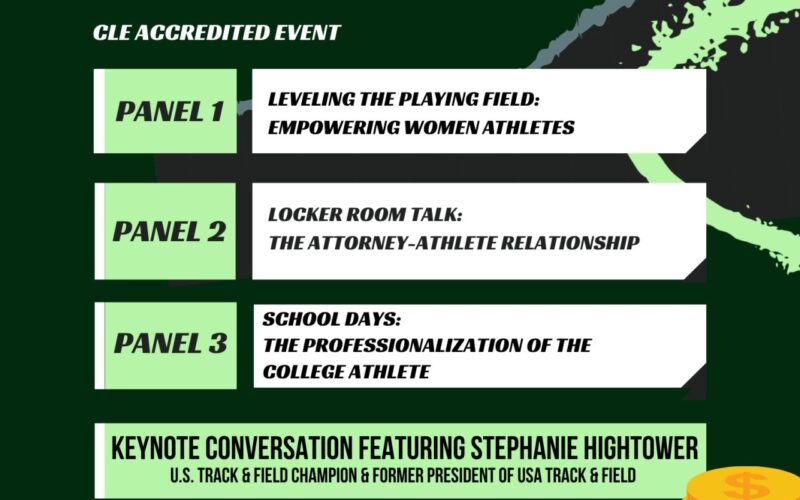Panel: “Leveling the Playing Field: Empowering Women Athletes” during the BESLS 5th Annual Sports Law Symposium
Introduction
On Friday, October 24, 2025, the Brooklyn Entertainment and Sports Law Society (BESLS) hosted its 5th annual Sports Law Symposium, “Athlete Inc.: Athlete as Entrepreneur.” The symposium’s first panel, titled “Leveling the Playing Field: Empowering Women Athletes,” was co-sponsored by the Legal Association for Women (LAW). LAW is a student organization dedicated to fostering a community that supports and empowers women and people of all gender expressions in law school, equipping them for successful careers in the legal field.
The panel was moderated by Ben Stockman, Co-Chair of Venable’s Sports Law Group and featured panelists: Michael Goldsholl, Senior VP for Business and Legal Affairs for the Women’s National Basketball Association (WNBA); Sascha Malas, Head of Overtime Select & Director of Content Operations; Tia Thevenin an Associate at Manatt, Phelps & Phillips; and Hillary Wyse, Associate Director for Wasserman Team Sports. With varied educational and professional backgrounds, each panelist offered unique insight into the changes and challenges facing women’s professional athletics during a time of increased growth and exposure.
Attention to Detail
Stockman opened the discussion by noting that women’s professional sports are exploding, with eight professional women’s sports leagues launching in the past three years. Panelists discussed issues such as the challenges that come with launching a new sports league, striving for the equitable treatment, accounting for growth, and non-lawyer athletes’ understanding and navigating partnership deals. Equitable pay for women athletes was a throughline of the entire discussion, with an emphasis on the correlation between increasing investment in women’s professional sports and the opportunity for increased pay as a result.
Goldsholl explained that WNBA union members are well-positioned in their ongoing collective bargaining agreement (CBA) negotiations, as the WNBA’s draft rules lead to almost all its players earning their degree and often graduate degrees. This high degree of education has proved helpful as players of the WNBA prioritize their bargaining chips. These franchises are increasing in value, but the business does not exist without the labor of its members, and they want to ensure they are paid appropriately for the increase in popularity and, as a result, franchise value.
As a former athlete, Thevenin explained that with the rise in attention to women’s sports, there is more information and education available to athletes in terms of knowing their worth in negotiations and leveraging their personal brands. Thevenin stressed the importance of athletes reading everything, such as partnership agreements, thoroughly, staying informed, and thinking critically about who they are as athletes, what they want to gain from their career long term, and what life after sports looks like when making decisions.
Written by: Meaghan Brady
Meaghan is a 2026 J.D. Candidate at Brooklyn Law School.




